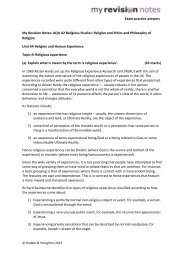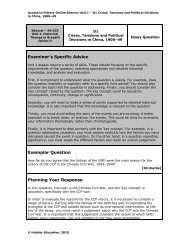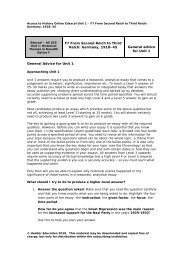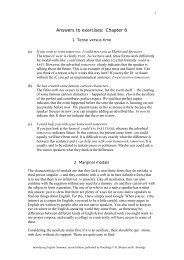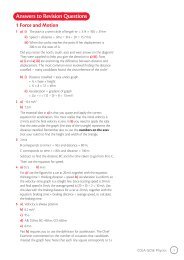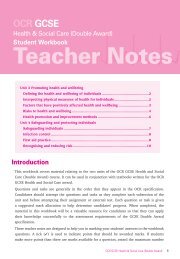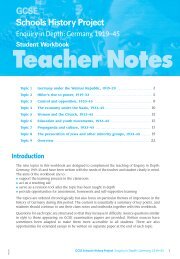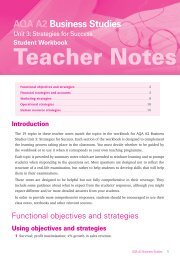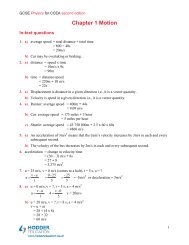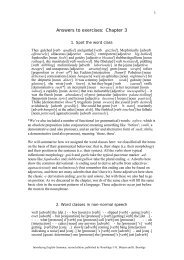Edexcel – Unit 1 - Access to History 2
Edexcel – Unit 1 - Access to History 2
Edexcel – Unit 1 - Access to History 2
Create successful ePaper yourself
Turn your PDF publications into a flip-book with our unique Google optimized e-Paper software.
<strong>Access</strong> <strong>to</strong> His<strong>to</strong>ry Online <strong>Edexcel</strong> <strong>Unit</strong> 1 – A6 The Wars of the Roses in England, 1455–85Devils was held there in 1459 since it was easierfor Margaret of Anjou <strong>to</strong> control Parliament awayfrom London and so condemn the Yorkists in theirabsence, causing further tension. In the sameway, York was able <strong>to</strong> flee <strong>to</strong> Ireland in 1459 andWarwick was able <strong>to</strong> use his Captaincy at Calais <strong>to</strong>protect himself and raise troops. This situationmeant that neither side was able <strong>to</strong> gain theupper hand in the conflict as both were able <strong>to</strong>withdraw, regroup and recruit armies when theyneeded <strong>to</strong>. This contributed <strong>to</strong> the continuation ofthe civil war (12).Although other fac<strong>to</strong>rs explain why the wars brokeout and continued, the most important fac<strong>to</strong>r wasthe weakness of Henry VI as king which allowedYork <strong>to</strong> become <strong>to</strong>o powerful and caused him <strong>to</strong>rebel. Medieval kings were expected <strong>to</strong> keep lawand order at home and <strong>to</strong> protect the countryfrom invasion. Henry VI was a peace-loving kingwho disliked war. He was easy <strong>to</strong> manipulate – inthe period 1455–60, whoever controlled the kingcould control the country. Worse still, in 1453 hesuffered a nervous breakdown which left himunable <strong>to</strong> rule the country and led <strong>to</strong> conflictabout who should be Protec<strong>to</strong>r. Henry’s rulehelped <strong>to</strong> bring about civil war. He was blamed byYork and other members of the nobility for thehumiliating English losses in France – by 1453,only Calais was still in English possession. Inaddition, Henry’s lack of financial managementhad left him in massive debt. By 1450, the Crownwas £372,000 in arrears. This particularly affectednobles such as York who had lost lands andincome in France and were owed money for theirservices in France which were not paid – York wasowed nearly £40,000. Finally, Henry mismanagedhis kingdom by allowing local disputes <strong>to</strong> get ou<strong>to</strong>f control, for example the Nevilles andPercys inthe North and the Bonvilles and Courtenays in theSouth-West. Without a strong king, these disputesescalated and led <strong>to</strong> side taking, with the Nevillesand Courtenays looking <strong>to</strong> York for supportagainst their enemies. If there had been astronger or more decisive king on the throne,members of the nobility such as York or theNevilles would have been kept under control. Itwas the weakness of Henry VI and his failures asking that led <strong>to</strong> York’s alienation and allowed war<strong>to</strong> break out and <strong>to</strong> continue (13).(12) This paragraph deals with adifferent fac<strong>to</strong>r. It is less wellsupportedthan the earlierparagraphs, but demonstratesrange and balance.(13) This paragraph considers afinal point and balances theearlier arguments about the roleof York. York’s actions are putin<strong>to</strong> the context of Henry’s poorrule <strong>to</strong> help reach a judgementabout who was really <strong>to</strong> blame.In conclusion, York’s ambition and position inEngland were certainly important in the outbreak© Hodder Education, 2010



